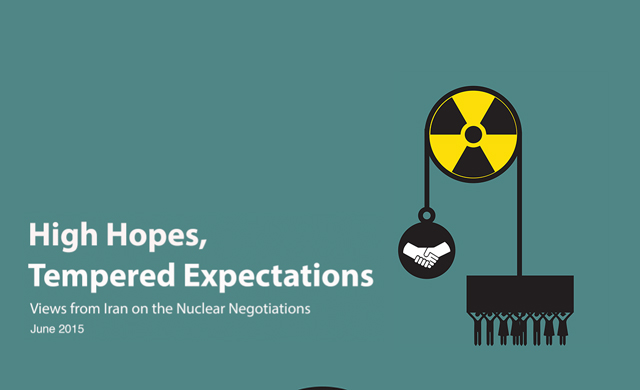
Image from ICHRI's new report ” High Hopes, Tempered Expectations: Views from Iran on the Nuclear Negotiations.”
Global Voices collaborators the International Campaign for Human Rights in Iran released a newly written report yesterday entitled “High Hopes, Tempered Expectations: Views from Iran on the Nuclear Negotiations.”
The report engaged with 28 members of Iranian civil society including former members of the Iranian Parliament, journalists, academics, lawyers, economists, filmmakers, writers, publishers, actresses, playwrights, activists, and family members of political prisoners. The key finding was unanimous support for the nuclear negotiations and an agreement to lift sanctions. The following are some of the key findings made from this sample group.
• Seventy-one percent of respondents expect economic benefits from an accord, typically citing increased investment and oil revenues, and gains to employment, manufacturing, and growth. However, one-fifth of those expecting economic gains believe these benefits could be lost to ordinary Iranians due to governmental mismanagement.
• Twenty-five percent of all respondents expect any economic benefits would reach only the upper levels of society and those connected to power, due to entrenched and rampant corruption and the administration’s lack of authority to confront rival centers of power.
• Sixty-one percent of the respondents believe a deal would improve the chances of achieving political and cultural reforms, as the administration could now turn its attention to such issues and it would be significantly strengthened politically in its ability to enact change.
• Thirty-six percent expected no improvement in political or cultural freedoms. Some cited the Rouhani administration’s lack of power and authority, especially vis-à-vis the legislative and judicial branches and Iran’s Supreme Leader, Ali Khamenei. Others questioned Rouhani’s willingness to push forward with reforms, noting his few efforts even in the spheres that are under the president’s direct control.







1 comment